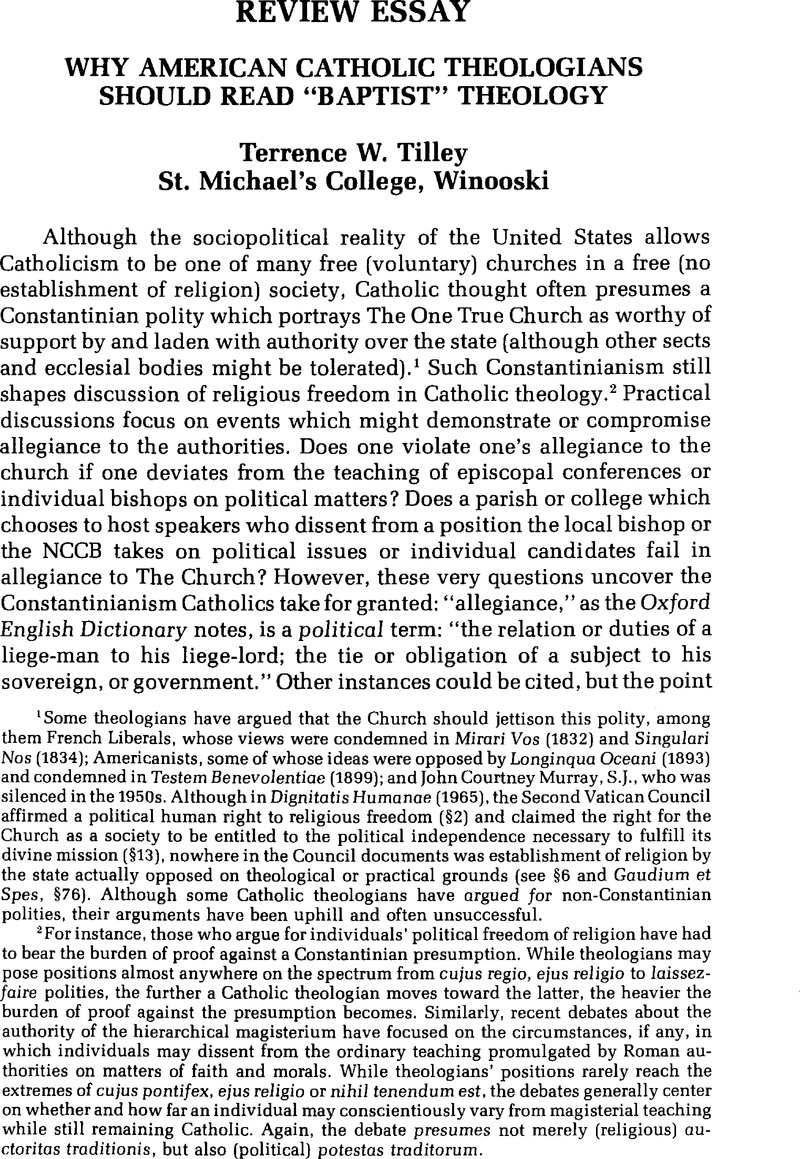No CrossRef data available.
Article contents
Why American Catholic Theologians Should Read “baptist” Theology
Published online by Cambridge University Press: 09 September 2014
Abstract

- Type
- Review Essay
- Information
- Copyright
- Copyright © The College Theology Society 1987
References
1 Some theologians have argued that the Church should jettison this polity, among them French Liberals, whose views were condemned in Mirari Vos (1832) and Singulari Nos (1834); Americanists, some of whose ideas were opposed by Longinqua Oceani (1893) and condemned in Testem Benevolentiae (1899); and John Courtney Murray, S.J., who was silenced in the 1950s. Although in Dignitatis Humanae (1965), the Second Vatican Council affirmed a political human right to religious freedom (§2) and claimed the right for the Church as a society to be entitled to the political independence necessary to fulfill its divine mission (§13), nowhere in the Council documents was establishment of religion by the state actually opposed on theological or practical grounds (see §6 and Gaudium et Spes, §76). Although some Catholic theologians have argued for non-Constantinian polities, their arguments have been uphill and often unsuccessful.
2 For instance, those who argue for individuals' political freedom of religion have had to bear the burden of proof against a Constantinian presumption. While theologians may pose positions almost anywhere on the spectrum from cujus regio, ejus religio to laissezfaire polities, the further a Catholic theologian moves toward the latter, the heavier the burden of proof against the presumption becomes. Similarly, recent debates about the authority of the hierarchical magisterium have focused on the circumstances, if any, in which individuals may dissent from the ordinary teaching promulgated by Roman authorities on matters of faith and morals. While theologians' positions rarely reach the extremes of cujus pontifex, ejus religio or nihil tenendum est, the debates generally center on whether and how far an individual may conscientiously vary from magisterial teaching while still remaining Catholic. Again, the debate presumes not merely (religious) auctoritas traditionis, but also (political) potestas traditorum.
3 Subsequent references are to the following principal writings by McClendon, : PCT = Pacemakers of Christian Thought (Nashville, TN: Broadman, 1962);Google ScholarBPS = “Baptism as a Performative Sign,” Theology Today 23/3 (October 1966), 403–16;CrossRefGoogle ScholarIB = “Why Baptists Do Not Baptize Infants,” ConciJium 24 (The Sacraments: An Ecumenical Dilemma), April 1967;Google ScholarBT = Biography as Theology (Nashville, TN: Abingdon, 1974);Google ScholarURC = Understanding Religious Convictions, with Smith, James M. (Notre Dame, IN: University of Notre Dame Press, 1975);Google ScholarTS = “Three Strands of Christian Ethics,” Journal of Religious Ethics 6/1 (Spring 1978), 54–80;Google ScholarE = Ethics: Systematic Theology, Volume 1 (Nashville, TN: Abingdon, 1986);Google ScholarCC = “Forged in the Crucible of Conflict,” Books and Religion, September 1986.Google Scholar He has also edited Is God GOD? with Steuer, Axel (Nashville, TN: Abingdon, 1981)Google Scholar, and written dozens of other articles.
4 Martinich, A.P., “Sacraments and Speech Acts,” Heythrop Journal 16 (1975), 289–303, 405–17CrossRefGoogle Scholar, independently explored this approach.
5 Most mainstream systematic theologies either leave ethics until last or pay little attention to the “moral implications” of doctrines.
6 Even the meticulous work of Fiering, Norman, Jonathan Edwards's Moral Thought in its British Context (Chapel Hill: University of North Carolina Press, 1981)Google Scholar tends to treat Edwards as a disembodied intellectual, rather than to show how his being a Puritan preacher with eleven children dismissed from his pulpit affected his writing his “greatest” works while a missionary on the frontier. Where Fiering images Edwards as breaking with his theological past and entering into serious philosophy, McClendon shows the continuity.
7 The practice of using cover stories also infects Roman Catholicism. The recent (as of this writing) appointment of Bishop Wuerl to “assist” Archbishop Hunthausen in Seattle may be a prime example of a deceptive or self-deceptive cover story, revealed in the crux of a confrontation over diocesan support or nonsupport for a civil rights measure and in subsequent reactions among Catholics within and without that diocese. Although MacIntyre would not consider constructing cover stories a practice, this is because he seems to think practices are intrinsically good.


